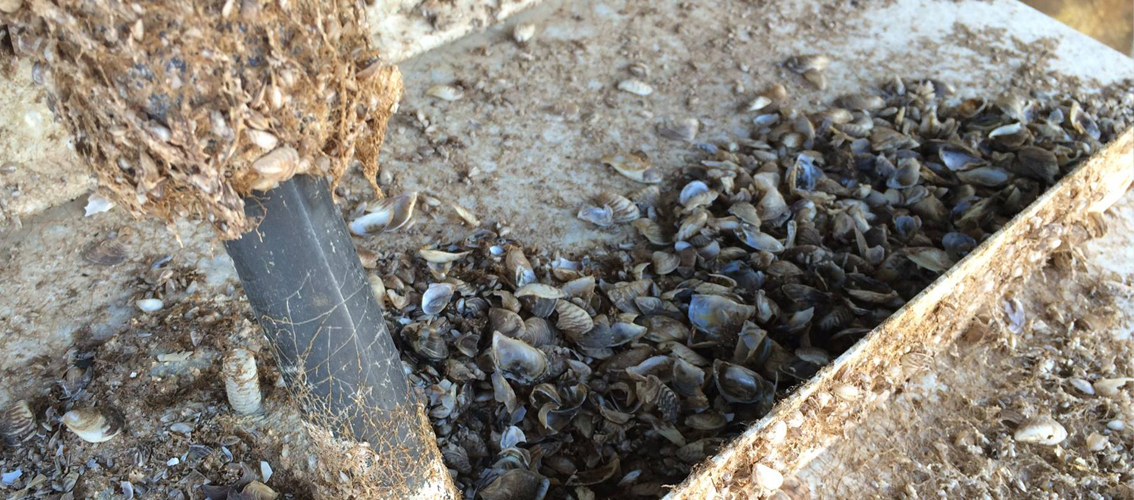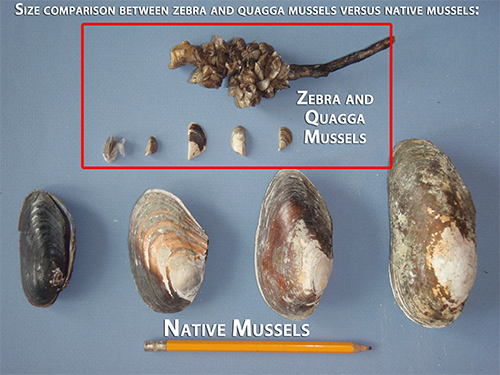Zebra and quagga mussel facts

Quagga mussels (Dreissena rostriformis bugensis) and zebra mussels (Dreissena polymorpha) are not native to North America. They were introduced by international shipping from the Baltic Sea to Canada (the Great Lakes region) and the United States in the 1980s. Since their introduction, these mussels have spread in Ontario and Quebec. They are also found in over 24 American states as far west as California. In October 2013, zebra mussels were discovered in Lake Winnipeg, Manitoba. In 2016, invasive mussels were confirmed in the Tiber Reservoir in Montana. Although the mussels are not yet present in B.C., ZQM could survive in B.C. lakes and rivers if introduced.
Spread
Unlike B.C.’s native mussels, Zebra and Quagga mussels attach to hard surfaces. These small, freshwater mussels can easily attach themselves to boat hulls, trailers, motors, equipment, vegetation and other organisms. This allows them to be brought by boats and equipment between water bodies. Mussels are very small when they first attach to surfaces, making them very difficult to detect, as they are only a few millimeters in size. They reproduce quickly and are extremely difficult to eradicate once they become established in an area. In larger water bodies and complex ecosystems, they may be impossible to eradicate unless they are detected and dealt with early.
Zebra and quagga mussels can survive for several weeks outside of the water if they are left in a cool and moist environment. This means that mussels that are attached to boats or equipment can survive a trip between different bodies of water. Their microscopic free-swimming larvae can also survive for several weeks in small pools of water inside boats or other equipment. Freshwater invasive mussels usually spread by accident, unintentionally carried on recreational boats on trailers. Boats coming from the United States and carrying mussels have been found and cleaned every year before they arrive in B.C. water bodies.
Threat to B.C.
Zebra and quagga mussels represent a serious threat to B.C.’s aquatic ecosystems, salmon populations, hydropower stations and other infrastructure facilities.
Zebra and quagga mussels can significantly change aquatic food webs. Such changes could mean the collapse of valuable native fish populations in B.C., such as sockeye salmon. Zebra and quagga mussel infestations can replace native aquatic plants and wildlife, worsen the environment and reduce drinking water quality. These mussels have been recognized as a threat to B.C.’s endangered Rocky Mountain Ridged Mussel (Gonidea angulata).
They can clog pipes, water intake systems (hydropower facilities, agriculture irrigation systems), and municipal water supplies. This can increase maintenance costs for operators. These mussels are also a problem for recreation and tourism, as mussel shells can injure swimmers near the shore or docks, damage boat propellers and potentially dirty our drinking water.
Zebra and quagga mussels pose significant economic risks due to their impacts on infrastructure and waterbodies. A previous 2013 study estimated the costs of a zebra and quagga mussel invasion in B.C. would be $43 million annually ($53.4 million in 2022 CAD). The 2013 study looked at impacts to hydropower, agricultural irrigation, municipal water supplies and recreational boating. The Province has since updated the 2013 estimate to include additional sectors such as tourism and property values and the updated results have been published in the 2023 report “Potential Economic Impact of Zebra and Quagga Mussels in B.C.”.
The updated annual cost estimates if zebra and quagga mussels were to be introduced into B.C. range from $64 to $129 million, and include:
- $33.7 – $92.5 million in mitigation costs for water-related infrastructure; including $17.1 – $23.3 million for hydro infrastructure; $8.0 – $49.7 million for water supply infrastructure for municipal, domestic and aquaculture; and $2.5 – $5.3 million for agricultural irrigation and golf courses
- $3.7 – $8.1 million in additional annual maintenance to boats and marinas
- $2.5 – $12.6 million in lost profits and provincial revenues from losses in water-based non-resident tourism; and
- $30.2 million annualized loss in residential property values and property taxes due to reduced water quality and lost shoreline amenity values.
There has been no reported introduction of live quagga or zebra mussels into B.C. lakes or waterways. Zebra and quagga mussels are not established in British Columbia, Alberta, Saskatchewan, Oregon, Idaho, Montana or Washington.
How to Identify Zebra & Quagga Mussels
Distinguishing features of Zebra & Quagga Mussels:
- Range in size from 1 mm to 3 cm (1 inch) as adults
- Have propeller-shaped shells
- Are brown or cream coloured, and may have zebra stripes (though not a distinguishing feature)
- Often form groups or clumps, like some marine mussels


Native Freshwater mussels:
In comparison to ZQ Mussels, freshwater mussels that are native to B.C. are much larger, have a different shape, and cannot attach to hard surfaces.
- Most species' adults are far larger than zebra and quagga mussels (larger than 3 cm/1 inch)
- Either oval or heart shaped
- Buried, partially buried or on soft surfaces like sand, or between cobbles
- Do not form clumps or attach to vertical surfaces

Size Comparison Between Zebra & Quagga Mussels Versus Native Mussels


